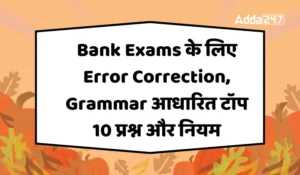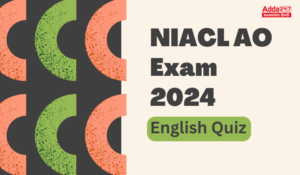
IBPS PO Prelims is in its way and lot of aspirants are heading towards new hopes with this upcoming opportunity. Thus, English Language can be an impetus for their success by saving time and scoring well. So, instead of boiling the ocean, try building up a strong vocabulary, an effective knowledge of grammar, and efficient comprehension skills so as to be on the ball to face this particular section. Here is a quiz on English Language being provided by Adda247 to let you practice the best of latest pattern English Questions for upcoming IBPS PO exam.
Directions (1-15): Read each of the sentences to find out whether there is any error in it. The error, if any, will be in one part of the sentence. The number of this part is your answer. If there is no error, mark option (e) as your answer.
Q1. The chief difficulty is that the transition from a gilded (A)/ age to a progressive era require a fundamental (B)/ shift in the underlying political economy that (C)/ allows for, and perhaps even engenders, the transition (D)/ from a bad equilibrium to a good one (E)/.
A
B
D
E
No Error
Solution:
The error is in part B of the sentence. Transition is a singular subject and so 'requires' will be used here.
Q2. Foreign multinationals that claim to have research (A)/ and development centres in India do (B)/ not do real engineering work in the country (C)/, as it is natural for any company to have (D)/real product development in home soil (E)/.
B
C
D
E
No Error
Solution:
There is prepositional error in part E. We will use 'on' home soil. Use of 'in' home soil is incorrect here.
Q3. The intensity of competition has steadily increased(A)/ since the entry of Reliance Jio, founded by the deep-pocketing (B)/ billionaire Mukesh Ambani. This has left the incumbents battling (C)/ furiously to protect their turf with tariff reductions to match the (D)/ newcomer’s ‘no prisoners’ approach to pricing of its voice and data services (E)/.
A
D
B
E
No Error
Solution:
Error is in part B of the sentence. Deep-pocketed will be used here to refer to billionaire Mukesh Ambani. A deep-pocketed person or organization has a lot of money to spend.
Q4. Besides, the proposed ‘cure’ may make another (A)/ problem worse: when parents are unable to ensure (B)/ regular attendance of children due to social circumstances (C)/ , it is inconceivable that detaining them for non-performance will (D)/ act as an incentive to attend school regularly (E)/.
B
C
D
E
No Error
Solution:
There is no error in the sentence.
Q5. In their response to the crisis, communities and environmentally (A)/ minded individuals are ahead of governments and (B)/ municipal authorities. They segregate waste, compost at home,(C)/ conduct “plastic free” social events and helping recover materials that (D)/ would otherwise just be dumped in the suburbs and wetlands (E)/.
A
D
C
E
No Error
Solution:
In part D of the sentence, 'help' will be used here in place of helping as per parallelism.
Q6. The Rafale deal have been the subject of (A)/ heated claims and counter-claims on two broad issues (B) — that the contract to purchase 36 French (C)/ multi-role fighter aircrafts was grossly overvalued and that it was (D)/ tainted by crony capitalism.(E)/
A
B
C
D
No Error
Solution:
The error is in part A of the sentence. Here, deal is a singular subject so we will use 'has' in place of 'have'.
Q7. If the political war (A)/ over Rafale continues (B)/, it is defence (C)/ modernisation that will becomes (D)/ the real victim.(E)/
A
B
E
D
No Error
Solution:
Error is in part D. Here 'become' will be used in place of 'becomes'.
Q8. Heavy rain has driven the (A)/ Himachal Pradesh government (B)/ to order closure of all (C)/ schools in Kullu and (D)/ Kinnaur districts on Monday. (E)/
B
D
A
C
No Error
Solution:
There is no error in the sentence.
Q9. Nearly 500 people have become (A)/ homeless in the Hossainpur (B)/ area of Murshidabad district (C)/ due to severe river bank (D)/ erosion in the Ganges.(E)/
D
C
B
E
No Error
Solution:
There is prepositional error in part E of the sentence. We will us erosion 'by' the ganges instes of 'in' the Ganges.
Q10. Labour advocates have long (A)/ complained that international trade (B)/ agreements have driven by corporate (C)/ agendas and pay little attention (D)/ to the interests of working people.(E)/
A
B
C
E
No Error
Solution:
The error is in part C of the sentence. We will use 'are in place of 'have' here.
Q11. The government has launched the (A)/ ‘cyber trivia’ app for children to countering (B)/ / incidents of cybercrimes against (C)/ children due to dangerous games like (D)/ ‘Blue Whale’ and ‘Momo Challenge’.(E)/
A
B
C
D
No Error
Solution:
The error is in part B of the sentence. To will be followed by first form of verb, i.e., to counter.
Q12. India successfully conducted an interceptor (A)/ missile test from Abdul Kalam Island in (B)/ Odisha on Sunday night,(C)/ achieving a major milestone in developing a (D)/ two-layer Ballistic Missile Defence system.(E)/
A
B
D
E
No Error
Solution:
The sentence is correct as it is. There is no error in the sentence.
Q13. While growing up, vacations were (A)/ something that we look forward (B)/ to but they came with a catch.(C)/ Mother would give us a list of (D)/ things to do during the entire holidays.(E)/
B
D
C
A
No Error
Solution:
Error is in part B of the sentnece. 'Looked'
will be used in place of look as the sentenvce is in past tense.
will be used in place of look as the sentenvce is in past tense.
Q14. Many of us fell in love (A)/ with reading, sketching, staring at (B)/ space, music and making things (C)/, because we had the (D)/ opportunity to get bored (E)/.
B
D
A
C
No Error
Solution:
No Error
Q15. To sip the lemonade or milkshake, to swirl the drink (A)/ around in the mouth, to just sit in the garden steps (B)/ watching the dusk chase the day away, exhausted (C)/ from the adventures of tree-climbing, butterfly-chasing or spinning fantastic (D)/, unbelievably impossible stories, were a luxury.(E)/
D
A
B
E
No Error
Solution:
Error is in part B of the sentence. 'on'
will be used in place of 'in'. We sit on the garden steps, not in the garden steps.
will be used in place of 'in'. We sit on the garden steps, not in the garden steps.





 Practice for English Section: 15 Cloze T...
Practice for English Section: 15 Cloze T...
 Bank Exams के लिए Error Correction, Gram...
Bank Exams के लिए Error Correction, Gram...
 English Quiz For NIACL AO Mains 2024 Exa...
English Quiz For NIACL AO Mains 2024 Exa...










